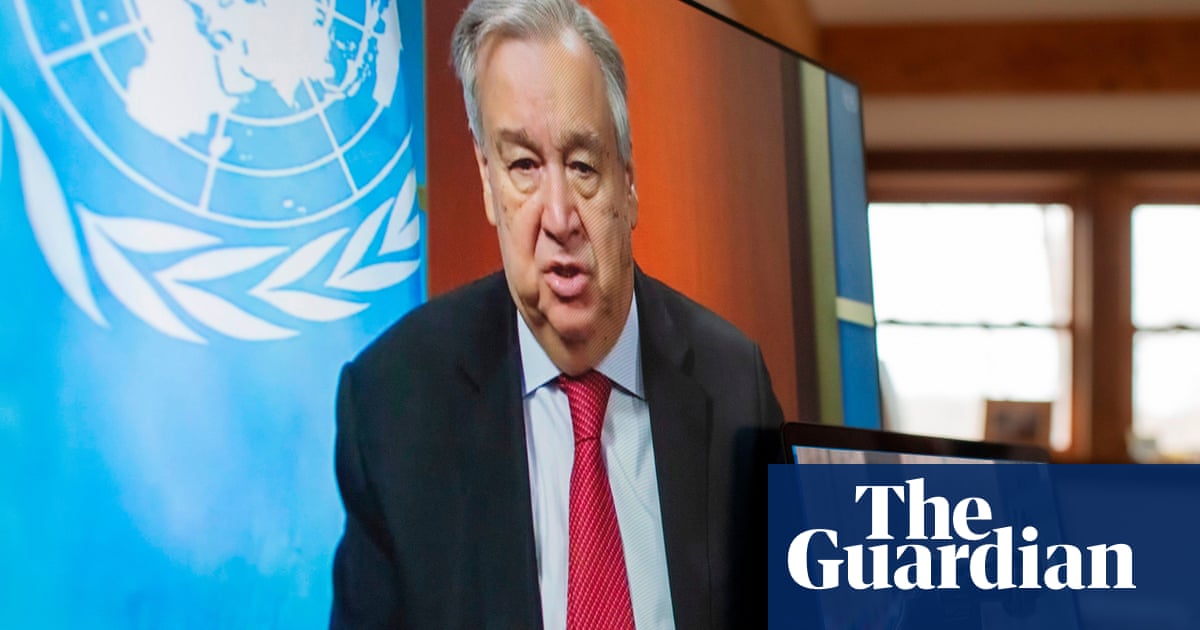
The UN Secretary-General will deliver one of his sharpest speeches to date today, attacking “myths, illusions and falsehoods” about international progress on equality.
In an unusually worded speech, António Guterres called for a major overhaul of the UN security council, the International Monetary Fund and the World Bank, to address the systemic inequalities exposed by the coronavirus pandemic.
The health crisis revealed the fragility of the world and “exposed risks that we have ignored for decades: inadequate health systems; gaps in social protection; structural inequalities; environmental degradation; the climate crisis,” he said.
He said the pandemic was exposing “fallacies and falsehoods everywhere: the lie that free markets can provide health care for all. The fiction that unpaid care work is not work, the illusion that we live in a post-racist world, the myth that we are all in the same boat. ”
The anger of the #MeToo and Black Lives Matter movements was a measure of “total disillusionment with the status quo,” Guterres said, while colonialism and patriarchy were historical sources of inequality.

Let’s not fool ourselves. The legacy of colonialism still resonates. We see this in economic and social injustice, the increase in hate crimes and xenophobia; The persistence of institutionalized racism and white supremacy.
“We see this in the global trading system. Colonized economies are at greater risk of being trapped in the production of raw materials and low-tech goods, a new form of colonialism. And we see this in global power relations. “
Speaking from the UN headquarters in New York, Guterres was giving Nelson Mandela’s annual lecture, on what would have been Mandela’s 102nd birthday, to an online audience for the first time in its 18-year history.
Africa, Guterres said, had been a “double victim”, first because of colonialism and second, because African countries were underrepresented in the international institutions established after the Second World War.

“The nations that came out on top 70 years ago have refused to contemplate the reforms necessary to change power relations in international institutions. The composition and voting rights in the UN security council and the boards of the Bretton Woods system are a good example. Inequality starts at the top: in global institutions. Addressing inequality must start by reforming them. ”
He said that the most advanced countries had failed to provide the necessary support for the developing world in these “dangerous times.” He called for a new global agreement, based on equity and a renewed social contract, to provide universal health coverage and the possibility of a universal basic income.
His comments follow those of the outgoing UN special rapporteur on extreme poverty and human rights, Philip Alston, who described the World Bank’s international poverty line of $ 1.90 (£ 1.50) per day as an “outrageously unambitious benchmark” who had painted a false picture of “heroic gains” against poverty.
Guterres said the world had been brought to its knees by a microscopic virus that had delayed progress in eradicating poverty and reducing inequality for years. He warned that it could cause “historic proportion” famines and push 100 million people into extreme poverty.
“We are facing the deepest global recession since World War II and the broadest collapse in income since 1870,” he said. Workers in the informal economy, small and medium-sized enterprises and people with care responsibilities, mostly women, were the most affected.
“Deep disparities begin before birth and define lives and early deaths,” he said.

He said that more than 70% of the world population lived with an increase in income and wealth inequality, while the 26 richest people had as much wealth as half of the world population. In developed countries, more than 50% of 20-year-olds were in higher education, a figure that fell to 3% in less developed countries.
“Even more shocking: About 17% of children born 20 years ago in countries with low human development have already died.”
They all suffered the consequences, he said, because inequality was linked to economic instability, corruption, financial crises, crime, and physical and mental health.
Guterres said the climate crisis and digital transformation were “seismic shifts” that would define the 21st century and announced a new movement for racial equality, human rights and the rights of future generations. Young climate activists were on the front line, he said.
“This movement rejects inequality and division, and unites youth, civil society, the private sector, cities, regions and others behind the policies of peace, our planet, justice and human rights for all. It is already making a difference.
“Now is the time for world leaders to decide: will we succumb to chaos, division and inequality? Or will we correct the mistakes of the past and move forward together, for the good of all?
“We are at the breaking point. But we know which side of the story we are on. ”
.